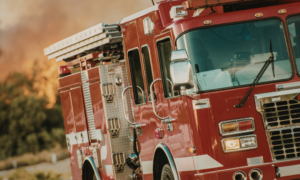You spend Fire Prevention Week teaching others how to stay safe. In that same spirit, let’s make sure your financial house is just as fireproof. After all, an unexpected expense shouldn’t turn into a five-alarm blaze that burns through your savings.
A little prevention can keep a money spark from raging out of control. In honor of Fire Prevention Week, we’re hitting four key areas to fireproof your finances: building an emergency cash fund, covering your insurance deductibles, checking beneficiaries, and securing disability coverage.
Build Your Emergency Cash Reserve
When a financial emergency strikes, you’ll want to grab your emergency fund. This is your first line of defense – a stash of readily available cash for the unexpected. Job loss, surprise home repairs, medical bills, the car’s transmission dying on the highway – consider these your “financial fires.” Without an emergency fund, you might be forced to throw the expense on a high-interest credit card or beg for a loan. That’s like fighting a fire with gasoline. Not good. Unfortunately, nearly 60% of Americans couldn’t cover a $1,000 emergency from savings¹. That’s like finding out most people’s financial smoke detectors have dead batteries.
So how much should you have in your reserve? You’ve probably heard the classic advice: 3–6 months of living expenses in a savings account, earmarked for emergencies. For a firefighter’s household, think about all your essential bills: mortgage or rent, utilities, food, loan payments, etc. If that totals $4,000 a month, you’d aim for $12,000–$24,000 set aside. It sounds like a lot – and it is – but don’t get overwhelmed. Start small and build up. Having even $500 to $1,000 in quick cash could keep many families out of serious financial trouble.

Building Your Emergency Fund
| Level | Target Amount | Purpose |
|---|---|---|
| Level 1: Starter | $500 - $1,000 | Cover minor emergencies (car repair, urgent home fix) |
| Level 2: Basic | 1 Month Expenses | Handle unexpected bills without going into debt |
| Level 3: Standard | 3 Months Expenses | Survive short-term job loss or extended leave |
| Level 4: Secure | 6 Months Expenses | Weather major life disruptions with confidence |
| Level 5: Fortress | 6+ Months Expenses | Maximum financial security and peace of mind |
Disclosure: This table provides general guidance for emergency fund planning. Individual circumstances vary based on household size, income stability, and personal risk factors. Consult with a financial professional to determine the appropriate emergency fund target for your specific situation.
One more thing: keep your emergency fund accessible but not too accessible. A high-yield savings account is a great spot for your money can earn a bit of interest, and you can still get to it when needed. Don’t invest your emergency savings in stocks or long-term assets that could drop in value or be hard to sell quickly.
Now that you’re building a cash cushion for emergencies, let’s make sure one emergency in particular won’t catch you off guard.
Know Your Insurance Deductibles
Imagine you’re responding to a house fire, and your hose is only long enough to reach the front yard but not the burning kitchen. That hose is kind of useless, right? Well, insurance without an emergency fund to cover the deductible can be just as useless. Your insurance deductible is the amount you must pay out-of-pocket on a claim before the insurance kicks in to cover the rest. If you can’t pay that deductible, your insurance might as well not exist at all.
Homeowners and auto insurance policies commonly have deductibles of around $500 to $1,000². You might even choose a higher deductible to save on your premium. Likewise, health insurance often has an annual deductible that can be several thousand dollars before full coverage kicks in. The point is, when something bad happens, i.e., your house gets smoke damage, your car gets T-boned, or you need an unexpected surgery, you’ll typically need to pay the deductible amount upfront. Only then does your insurance company cover the rest.

Common Insurance Deductibles
Per claim on property damage, theft, or liability
Collision and comprehensive coverage claims
Annual deductible before plan coverage begins
Always have at least your highest deductible saved in your emergency fund. If you can't afford to pay your deductible out of pocket, your insurance won't help you when you need it most.
Disclosure: Deductible amounts shown are typical ranges and may vary by insurance provider, coverage level, and geographic location. Review your specific policy documents to understand your actual deductible obligations. This information is for educational purposes only and does not constitute insurance advice.
Finally, consider setting aside a dedicated fund just for insurance claims if you’re really meticulous. This could be part of your emergency fund or a separate account. Treat it like this: “I’m saving the $1,000 I save on premiums by having higher deductibles, in case I ever need to pay those deductibles.” If nothing goes wrong, great – you saved money. If something does, you’re ready to deploy your backup funds.
Now let’s look at a slower-burning issue that catches many people off guard: beneficiary designations. Making sure the right people (your family, not your ex or someone unintended) get the benefits you intend is a crucial part of financial fire prevention.
Check Your Beneficiaries
You wouldn’t ignore a frayed wire in your fire station, right? Leaving a faulty wire is asking for trouble down the road. Similarly, neglecting your beneficiary designations on financial accounts is a recipe for future chaos. It’s an easy thing to overlook. Life gets busy, paperwork gets filed and forgotten, but a beneficiary mistake can wreak havoc on your loved ones when you’re not around to straighten things out.
Set yourself a reminder (Fire Prevention Week could be a perfect annual trigger) to do a quick “beneficiary fire drill.” It might take you 30 minutes to call HR or log into each account and review the listed names. Ensure you have a primary beneficiary (like your spouse) and consider adding contingent beneficiaries (like your kids, or a trust) in case something happens to both you and your primary beneficiary. Also, make sure you have current contact info for them where applicable, and that they know they’re listed. An up-to-date beneficiary is like a clear incident command system – everyone knows who’s in charge if things go south.

Annual Beneficiary Fire Drill
Review these accounts during Fire Prevention Week
Beneficiary forms override your will! Even if your will says one thing, the beneficiary designation on file will determine who receives these assets. After divorce, remarriage, births, or deaths in the family, update immediately.
Disclosure: This checklist provides general guidance for reviewing beneficiary designations. Estate planning and beneficiary rules vary by account type, state law, and individual circumstances. Consult with an estate planning attorney or financial professional to ensure your beneficiary designations align with your overall estate plan.
Beyond avoiding catastrophic mistakes, keeping beneficiaries current can save a lot of time and heartache as it’s one less thing for your family to worry about during an already difficult time.
And while you’re at it, check the beneficiary rules on your pension or union plans. Some firefighter pensions have options for spousal benefits or payouts if you die in the line of duty. Make sure your department knows who should receive any death benefits. Double-check any life insurance provided by your city or union, too. It’s not the most fun task, but it’s a straightforward way to protect those you love.
But what if something happens while you’re still very much alive and kicking, something that stops you from being able to work and earn a paycheck? That’s where our final topic comes in: disability coverage.
Protect Your Income if You’re Sidelined
Every firefighter knows the risks of the job. You train hard, wear your gear, and take precautions, but injuries and illnesses can still strike like a lightning bolt. A fall through a collapsing floor, a car accident off-duty, or even a serious illness can take you out of work for weeks, months, or permanently. Would your finances survive if your paycheck stopped? For many, the answer is no. Enter disability insurance: essentially, insurance for your income.
A 20-year-old today has a 1 in 4 chance of becoming disabled before reaching age 67⁴. Yep, a 25% chance that at some point you won’t be able to work for an extended period due to injury or illness. In fact, the odds of disability are higher than the odds of dying young, yet many firefighters insure their lives but not their incomes. And while firefighting has excellent camaraderie and sick leave policies, those won’t pay the mortgage after your leave runs out.

The Hidden Risk to Your Income
Understanding Disability Statistics for Firefighters
before reaching retirement age (67)
Disclosure: Statistics sourced from the Social Security Administration. Individual disability risk varies based on occupation, health, age, and other factors. Firefighters may face elevated risks due to occupational hazards. This information is for educational purposes only. Consult with an insurance professional to evaluate your specific disability coverage needs and options.
Now, many firefighters do have some disability protections through their job. For example, if you’re hurt on the job, there’s typically workers’ comp or a service-connected disability pension that might pay out a portion of your salary. But be aware of the details. A job-related disability pension might only be, say, 50% of your salary (just as an example). Could you live on half pay long-term? Maybe not comfortably. And what if you get seriously sick (cancer, heart disease) or injured off the job? You might not qualify for the line-of-duty protections.
This is where having a long-term disability (LTD) insurance policy can be a lifesaver for your finances. LTD policies usually kick in after you’ve been unable to work for a certain period (often 90 days) and can replace a significant chunk of your income. Some departments offer an LTD benefit, so be sure to check if yours does and what it covers. If not, or if you want extra coverage, look into an individual policy.
In Conclusion
Every firefighter’s situation is unique. You might be a probie just starting out, or a seasoned lieutenant with kids heading to college. Tailor these tips to your life. The key is to stay vigilant. Don’t wait until an emergency happens to find out if you’re prepared – by then, it’s too late. Just like in a fire, seconds count; in finances, a little preparation now can save a world of hurt later.
If you’re not sure where to start or want a second set of eyes on your financial plan, we’ve got your back. Feel free to reach out to our team for a friendly review or just to ask questions!
Appendix:



